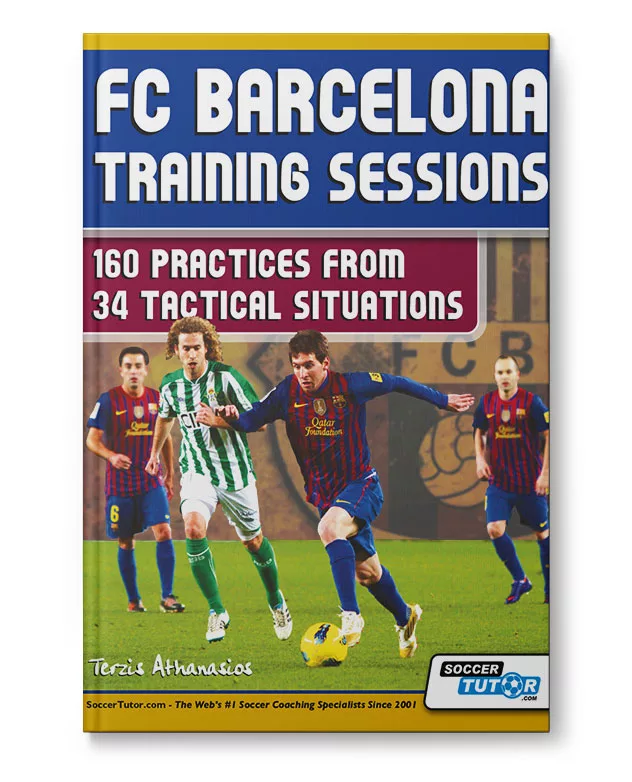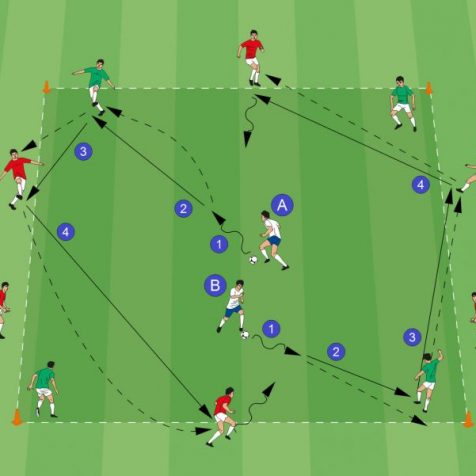Johan Cruyff, a name synonymous with revolutionary soccer, carved an indelible mark not only as a legendary player but also as a visionary coach. His transition from a dazzling player to a pioneering coach is a tale of passion, innovation, and influence. Underpinning his coaching career was a profound understanding of the game, transforming the very fabric of soccer with his philosophies. We take a look at Cruyff’s life as a coach, exploring his transition from the pitch to the sidelines, his favored tactics, his transformative years at Barcelona, and, most importantly, his monumental contribution to the world of soccer.
FC Barcelona Training Sessions
Learn to Coach your Team the Barca Way! Available as book & eBook!
- 160 Practices in 34 Sessions
- Full and extensive analysis of Pep Guardiola’s Barcelona team, often described as the best ever!
- 246 Pages, Level: U12-PRO
Early Life and Transition from Player to Coach
Johan Cruyff’s journey from a dazzling forward to an influential coach is a testament to his deep understanding and love for soccer. Born on April 25, 1947, in Amsterdam, Cruyff quickly rose through the ranks of Ajax, the club that would become synonymous with his name. As a player, he was the epitome of skill and intelligence, leading Ajax and later Barcelona to numerous triumphs. His playing style was characterized by incredible agility, strategic vision, and an uncanny ability to read the game, traits that would later define his coaching philosophy.
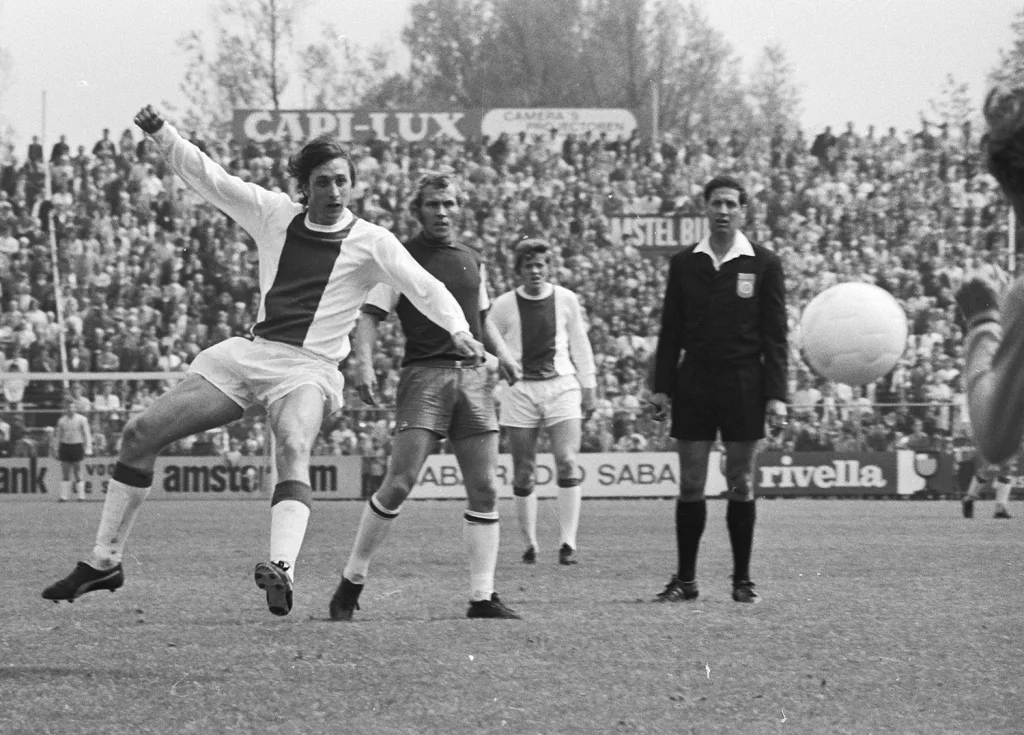
The transition from player to coach was almost a natural progression for Cruyff. In 1985, three years after retiring from professional soccer, he took over as the head coach of Ajax. His decision to move into coaching was driven by his desire to implement his ideas about soccer, ideas that were too revolutionary to be confined to the realms of a player. Even in his early coaching days, Cruyff’s approach was unorthodox. He believed in a fluid style of play, where positions were flexible and creativity was paramount. This approach not only refreshed Ajax’s playing style but also laid the groundwork for his future coaching endeavors.
Cruyff’s Coaching Philosophy
Johan Cruyff’s coaching philosophy was an intricate tapestry woven from his playing experiences and Rinus Michels’ pioneering concept of Total Football. This dynamic style, where players interchange positions seamlessly and maintain possession, became the cornerstone of Cruyff’s coaching methods. He was not just adopting Michels’ tactics; he was evolving them. By combining his own playing experiences with Michels’ strategies, Cruyff was setting the stage for a new era in soccer coaching.
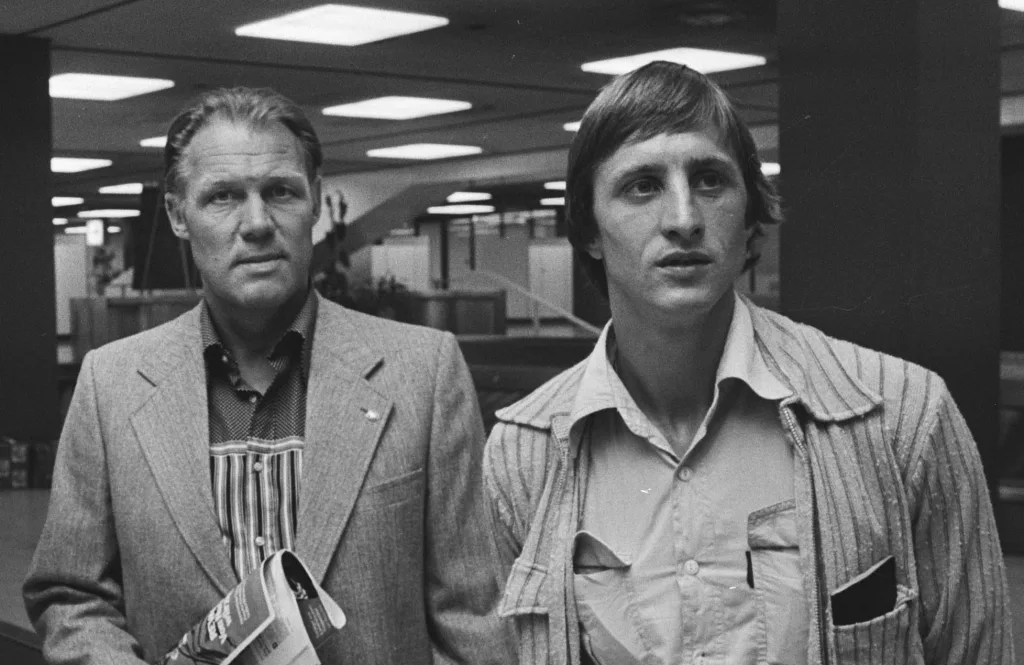
This philosophy was not just about tactics on the field; it was a comprehensive approach to soccer, encompassing player development, team structure, and even club management.
Cruyff’s vision was predicated on the idea that soccer should be played beautifully and intelligently. He emphasized skill, agility, and most importantly, tactical awareness. His teams were known for their fluid formations, quick passing, and constant movement, making it nearly impossible for opponents to predict or counter their strategies effectively. This approach required players who were not only technically proficient but also highly adaptable and smart.
Technique is not being able to juggle a ball 1000 times. Anyone can do that by practicing. Then you can work in the circus. Technique is passing the ball with one touch, with the right speed, at the right foot of your team mate.
Johan Cruyff
Total Football, as reinvented by Cruyff, was a system where any player could take over the role of any other player on the field. It was a radical departure from the rigid, position-based soccer of the past. Players were encouraged to express themselves, to take risks, and to think creatively. This required a high level of understanding and communication among the team, as players constantly rotated positions and responsibilities.
Underpinning this tactical fluidity was an unwavering commitment to ball possession. Cruyff believed that controlling the ball was key to controlling the game. His teams were trained to keep possession at all costs, a strategy that not only facilitated attacking play but also served as a defensive mechanism. The more a team had the ball, the less the opposition could do with it. This philosophy deeply influenced Pep Guardiola, who played under Cruyff at Barcelona. As a player in the “Dream Team,” Guardiola absorbed Cruyff’s vision of football, which emphasized ball possession, positional play, and pressing. This foundational understanding later became the cornerstone of Guardiola’s own coaching philosophy, where he credits Cruyff as his greatest mentor and the primary influence on his approach to the game.
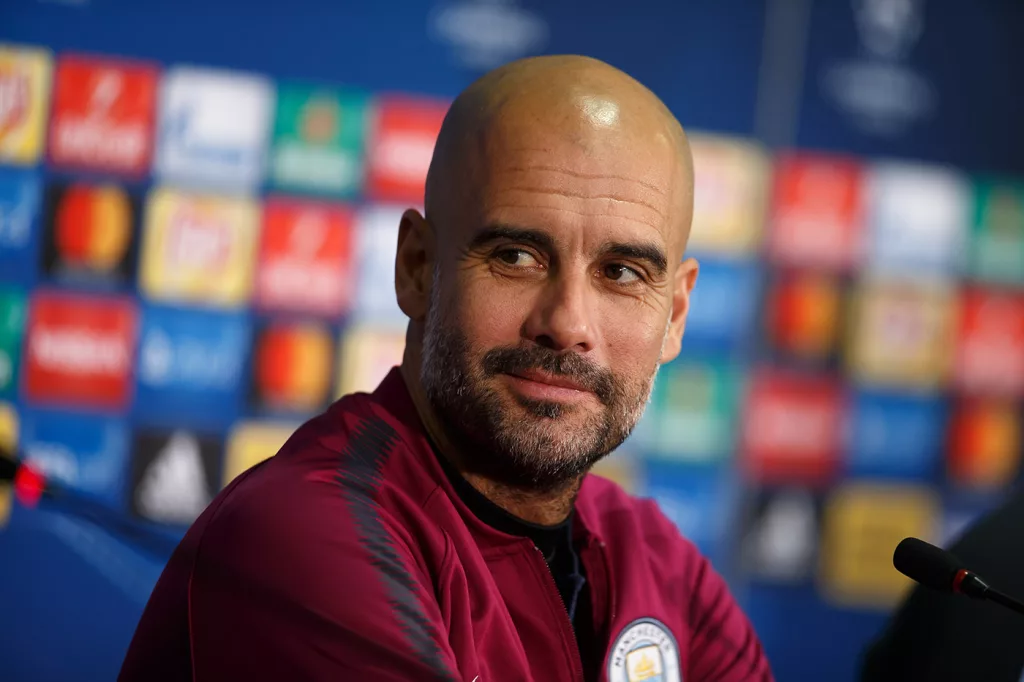
Cruyff’s philosophy extended beyond the tactical aspects to influence the very culture of the clubs he coached. At Ajax and Barcelona, he implemented a comprehensive approach to player development, focusing on nurturing young talent. He was instrumental in the evolution of Barcelona’s La Masia, the youth academy that would produce some of the finest players in soccer history.
Favorite Tactics and Formation
Johan Cruyff’s tactical genius was most vividly embodied in his favorite formation: the 3-4-3. This setup, while not entirely his invention, was honed and popularized by Cruyff, becoming a signature of his coaching era. The 3-4-3 formation under Cruyff was more than just a set of positions; it was a dynamic, fluid system that reflected his deep-seated beliefs in Total Football.
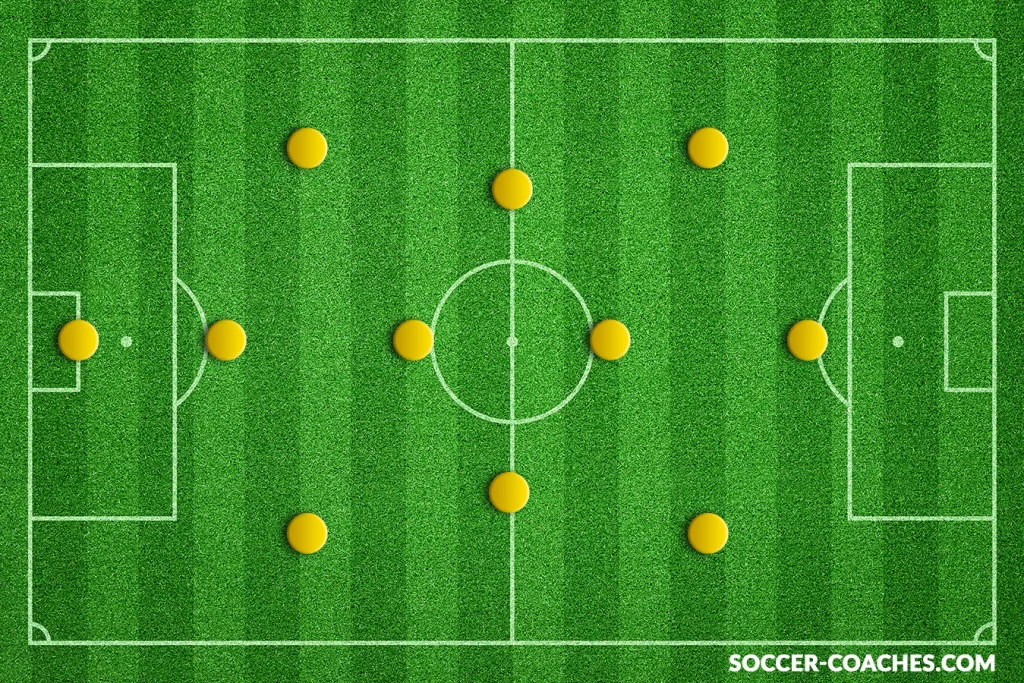
The three-man defense was a radical shift from the conventional four-man backline. Cruyff’s implementation of this system relied heavily on the intelligence and versatility of his defenders. They were not only required to be solid in their defensive duties but also capable of initiating attacks. This approach required defenders with exceptional ball-handling skills and the ability to read the game, anticipating both offensive opportunities and defensive threats.
In midfield, Cruyff deployed four players, but not in the traditional linear formation. This quartet had a complex, interchanging role, blurring the lines between defense, midfield, and attack. The central midfielders were the pivot of the team, controlling the tempo of the game, distributing the ball, and providing defensive support when needed. The wide midfielders, often mistaken as wingers, had the dual responsibility of supporting the attack and dropping back in defense, embodying the Total Football ethos of positional fluidity.
The front three, usually comprising two wingers and a central striker, were integral to Cruyff’s offensive strategy. This trio was tasked with creating scoring opportunities through quick, sharp movements and intricate passing. The wingers, with their pace and dribbling skills, were crucial in stretching the opposition’s defense, creating spaces for the central striker or advancing midfielders. The central striker, often a versatile forward, was responsible not just for scoring but also for linking up play, dropping back when necessary to create an extra man in midfield.
Cruyff’s 3-4-3 was groundbreaking, as it challenged traditional soccer tactics that prioritized rigid structures and positions. Instead, his formation was all about adaptability, intelligence, and teamwork. The players in a Cruyffian system had to have a deep understanding of the game, capable of making quick decisions and changing roles fluidly. This formation was not just a set of positions on the field; it was a manifestation of Cruyff’s soccer philosophy.
Cruyff’s Era at Barcelona
Johan Cruyff’s tenure as the coach of FC Barcelona, from 1988 to 1996, was a period of profound transformation and enduring legacy. His arrival marked the beginning of what would be known as the ‘Dream Team’ era, a golden age for the club both in terms of style and success. Cruyff didn’t just build a team; he revolutionized an entire club’s philosophy, laying down principles that continue to influence Barcelona to this day.
Cruyff built the cathedral, our job is to maintain and renovate it.
Pep Guardiola
One of the most significant impacts of Cruyff’s era was the emphasis on a style of play that combined technical skill with a relentless attacking mentality. Under his guidance, Barcelona played an attractive, offensive-minded game that was rooted in his Total Football philosophy. This approach led the team to win four consecutive La Liga titles and their first European Cup in 1992. Cruyff’s Barcelona mesmerized fans and opponents alike with their fluid, dynamic, and aesthetically pleasing soccer.
Central to this success was Cruyff’s focus on developing homegrown talent. He was instrumental in the evolution of La Masia, Barcelona’s youth academy, which became a model for soccer academies worldwide. Cruyff believed in nurturing young players, instilling in them the technical skills and tactical understanding required for his style of play. This approach led to the emergence of several world-class talents, who would go on to play significant roles for both the club and their national teams.
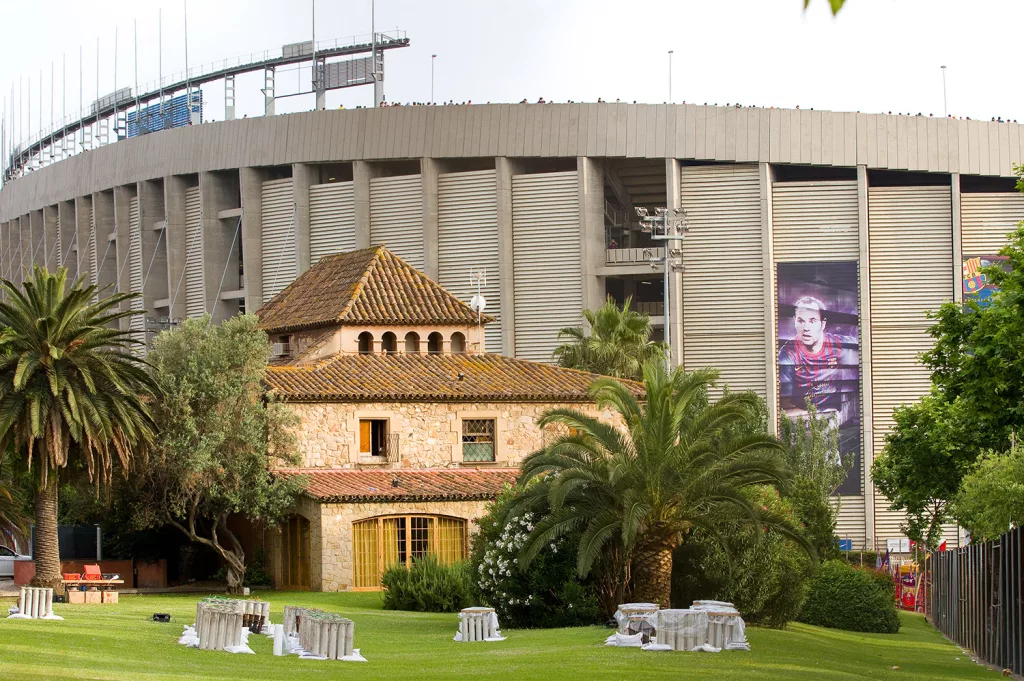
Cruyff also implemented a comprehensive approach to training and preparation. He introduced new training methods, focusing on ball control, short passing, and maintaining possession. These methods were not just about physical preparation but also about developing a deeper understanding of the game among the players. His training sessions were as much about sharpening the mind as they were about honing soccer skills.
FC Barcelona Training Sessions
Learn to Coach your Team the Barca Way! Available as book & eBook!
- 160 Practices in 34 Sessions
- Full and extensive analysis of Pep Guardiola’s Barcelona team, often described as the best ever!
- 246 Pages, Level: U12-PRO
Beyond the tactical and technical aspects, Cruyff’s influence extended to the very culture of the club. He instilled a winning mentality, but more importantly, a belief in a certain way of playing soccer. It wasn’t just about winning; it was about winning in style, with grace and creativity. This philosophy became ingrained in Barcelona’s identity, a legacy that outlived Cruyff’s tenure and influenced generations of players and coaches.
Legacy in Soccer
Johan Cruyff’s impact on soccer extends far beyond his achievements as a coach and player. His legacy is ingrained in the very essence of modern soccer, influencing coaching philosophies, tactical approaches, and the development of players worldwide. Cruyff was more than a coach; he was a visionary who reshaped the game.
One of the most significant aspects of Cruyff’s legacy is his influence on modern coaching. His philosophies and tactics have inspired a generation of coaches, including the likes of Pep Guardiola, who considers Cruyff his mentor. Guardiola’s success at Barcelona and beyond carries the imprint of Cruyff’s teachings, especially in terms of playing style, emphasis on possession, and the development of players from the youth academy. This ripple effect of Cruyff’s philosophy can be seen across Europe’s top leagues, where the emphasis on technical ability, tactical flexibility, and possession-based soccer has become increasingly prevalent.
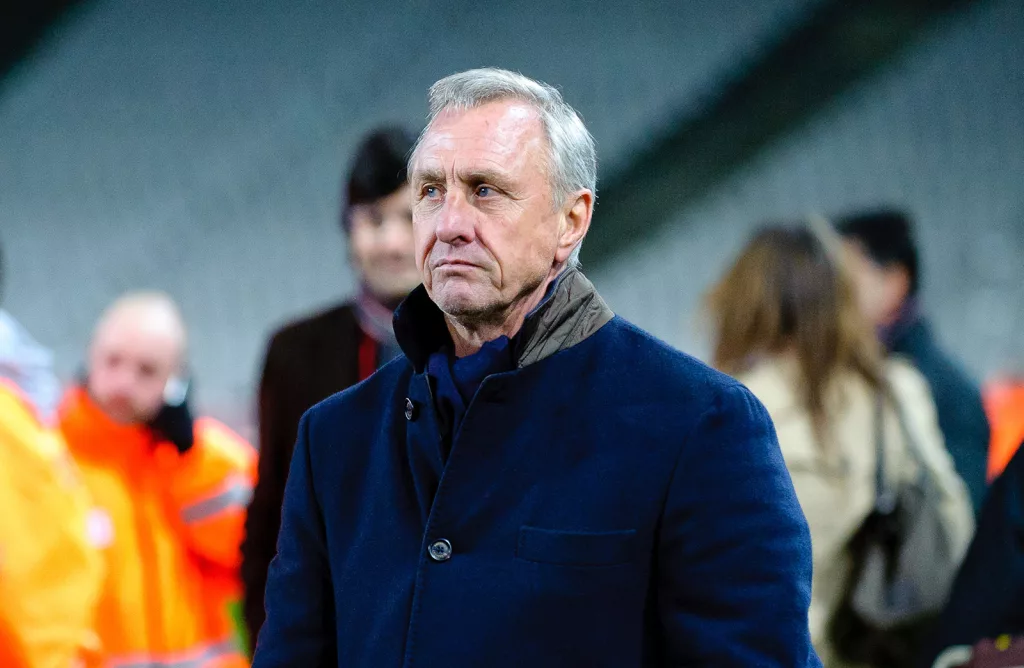
Cruyff’s legacy also shines through in the importance placed on youth development in modern soccer. His work at La Masia set a benchmark for youth academies globally. He championed the idea that nurturing young talent was as crucial as signing big-name players. This focus on youth development has been adopted by numerous clubs around the world, who now invest heavily in their academies to find and develop the next generation of soccer stars.
Moreover, Cruyff’s impact is evident in the tactical evolution of the game. His ideas about fluid formations, positional interchange, and attacking soccer have been embraced and adapted by teams at all levels. The increasing tactical sophistication seen in modern soccer can be traced back to the foundations laid by Cruyff’s Total Football approach.
Johan Cruyff left behind a philosophy that transcends wins, losses, and trophies. It’s a philosophy that speaks to the beauty and intelligence of soccer, a game where creativity and innovation are celebrated. His legacy is not just in the teams he coached or the players he developed but in the enduring belief that soccer should be played in a certain way – a way that delights, inspires, and captivates.
FC Barcelona Training Sessions
Learn to Coach your Team the Barca Way! Available as book & eBook!
- 160 Practices in 34 Sessions
- Full and extensive analysis of Pep Guardiola’s Barcelona team, often described as the best ever!
- 246 Pages, Level: U12-PRO

